Hero of the Soviet Union
| Hero of the Soviet Union | |
|---|---|
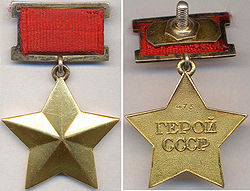 Gold Star Medal of the Hero of the Soviet Union |
|
| Awarded by the |
|
| Type | Honourary title |
| Eligibility | Soviet and foreign citizens |
| Awarded for | heroic feats in service to the Soviet state and society |
| Status | No longer awarded |
| Statistics | |
| Established | April 16, 1934 |
| First awarded | April 20, 1934 |
| Last awarded | December 24, 1991 |
| Total awarded | 12,745 |
| Precedence | |
| Next (higher) | none |
| Next (lower) | Order of Lenin |
| Related | Hero of the Russian Federation Hero of Ukraine Hero of Belarus |
The title Hero of the Soviet Union (Russian: Герой Советского Союза, Geroy Sovyetskogo Soyuza) was the highest distinction in the Soviet Union, awarded personally or collectively for heroic feats in service to the Soviet state and society.
Contents |
Overview
The award was established on April 16, 1934. The first recipients of the title originally received only the Order of Lenin, the highest Soviet award, along with certificate (грамота, gramota) describing the heroic deed from the Presidium of the Supreme Soviet of the USSR. Because the Order of Lenin could be awarded for deeds not qualifying for the title of hero, and to distinguish heroes from other Order of Lenin holders, the Gold Star medal was introduced on August 1, 1939. Earlier heroes were retroactively eligible for these items.
A hero could be awarded the title again for a subsequent heroic feat with an additional Gold Star medal and certificate. An additional Order of Lenin was not given until 1973. The practice of awarding the title multiple times was abolished by the Supreme Soviet of the USSR in 1988 during perestroika.
Many foreign citizens were awarded the title.
The title was also given posthumously, though often without the actual Gold Star medal given.
The title could be revoked only by the Presidium of the Supreme Soviet.[1]
History
The total number of persons who were awarded this title is 12,745 (twenty people have been stripped of this title due to various circumstances). The great majority of them received it during World War II (11,635 Heroes of the Soviet Union, 101 twice Heroes, 3 thrice Heroes, and 2 four-time Heroes). Sixty-five people were awarded the title for actions related to the Soviet-Afghan War, which lasted from 1979 until 1989. [1]
The first recipients of the award were the pilots Anatoly Liapidevsky (certificate number one), Sigizmund Levanevsky, Vasili Molokov, Mavrikiy Slepnev, Nikolai Kamanin, Ivan Doronin and Mikhail Vodopianov, who participated in the successful aerial search and rescue of the crew of the steamship Cheliuskin, which sank in Arctic waters, crushed by ice fields, on February 13, 1934. Valentina Grizodubova, a female pilot, was the first woman to become a Hero of the Soviet Union (November 2, 1938)[2] for her international women's record for a straight-line distance flight. Zoya Kosmodemyanskaya, a Soviet partisan, was the first woman to become a Hero of the Soviet Union during World War II (February 16, 1942).
101 people were to receive the award twice. A second award entitled the recipient to have a bronze bust of his/her likeness with a commemorative inscription erected in his home town.
Two famous Soviet fighter pilots, Aleksandr Pokryshkin and Ivan Kozhedub were thrice Heroes of the Soviet Union. A third award entitled the recipient to have his/her bronze bust erected on a columnar pedestal in Moscow, near the Palace of the Soviets, but the Palace was never built.
The only individuals to receive the title four times were Marshal Georgy Zhukov and Leonid Brezhnev. The original statute of the Hero of the Soviet Union, however, did not provide for a fourth title; its provisions allowed for a maximum of three awards regardless of later deeds. Both Zhukov and Brezhnev received their fourth titles under controversial circumstances contrary to the statute, which remained largely unchanged until the award was abolished in 1991. Zhukov was awarded a fourth time "for his large accomplishments" on the occasion of his 60th birthday on December 1, 1956. There is some speculation that Zhukov's fourth Hero medal was for his participation in the arrest of Beria in 1953, but this was not entered in the records. Brezhnev's four awards further eroded the prestige of the award because they were birthday gifts, on the occasions of his 60th, 70th, 72nd and 75th birthdays.
By the 1970s, the award had been somewhat devalued. Important political and military persons had been awarded on the occasions of their anniversaries rather than for any immediate heroic activity.
All Soviet cosmonauts, starting from Yuri Gagarin, as well as foreign citizens who participated in Soviet cosmic program as cosmonauts, received Hero award for each flight (but no more than twice).
Apart from individuals, the title was also awarded to twelve cities (Hero City) as well as the fortress of Brest (Hero-Fortress) for collective heroism during the War.
The last recipient of the title "Hero of the Soviet Union" was a Soviet diver, Captain of the 3rd rank Leonid Mikhailovich Solodkov on December 24, 1991 for fulfillment of a special diving task. Following the collapse of the Soviet Union, this title was succeeded in Russia by the title "Hero of the Russian Federation", in Ukraine by "Hero of Ukraine" and in Belarus by "Hero of Belarus".
Heraldry

The medal appears as a charge in the arms of The Hero City of Sevastopol (pictured on the left).
Notable recipients
Single award
- Nikolai Melnik - Soviet pilot known for placing radiation sensors at the Chernobyl's Nuclear Power Plant, Reactor 4, during the 1986 explosion.
- Ivan Isakov - Navy Admiral.
- Hamazasp Babadzhanian – led a brigade in the retaking of the river Dniester during WWII
- Lavrenty Beria – former NKVD and MVD chief
- Mikhail Devyataev – escaped from a forced-labor camp at Peenemünde with crucial intelligence on German rocket programs
- Pavel Grachev - Military Leader, division commander in Afghanistan, Minster of Defense of the Russian Federation.
- Yuri Gagarin – cosmonaut and the first human to fly in space
- Ivan Golubets – saved lives aboard the Soviet ship SK-0121 in 1942
- Vladimir Konovalov – submarine commander; sank the German ship Goya
- Zoya Kosmodemyanskaya – the first wartime female recipient; demonstrated bravery during her capture and execution by the Nazis
- Nikolai Gerasimovich Kuznetsov – A Soviet naval officer and People's Commissar of the Navy during World War II. Also Commander of the Soviet Navy and Naval Affairs Secretary, made Fleet Admiral of the Soviet Union in July 1955, and again (posthumously) in 1988 due to his wartime and postwar roles in the Navy
- Nikolai Kuznetsov – intelligence officer responsible for the kidnappings and assassinations of several high-ranking Nazis
- Lydia Litvyak – WWII fighter pilot and the world's top female ace, posthumously awarded.
- Alexander Matrosov posthumously awarded for blocking an enemy machine-gun with his own body.
- Ivan Panfilov - Soviet general. Died during the Battle of Moscow in a fierce infantry combat against German Tanks.
- Yakov Pavlov – led Soviet resistance during the Battle of Stalingrad
- Suren Petrosyan (1916 - ) - the commander of the 3rd battalion of the 5th guards landing brigade, participated in the forced crossing of the River Dnepr.
- Otto Schmidt – scientist and explorer of the Arctic
- Andrey Shestopalyko - In 1941 assisted his unit to break through Kiev enclosing.
- Lyubov Shevtsova - resisted Nazi occupation in WWII.
- Ivan Sidorenko - One of the top snipers of WWII, with over 500 kills. Was also a highly regarded sniper trainer.
- Lyudmila Pavlichenko - Prolific female sniper in the Red Army's 25th Rifle Division, credited with 309 kills before retirement. She also became the first Soviet citizen to be received by a U.S. President when Franklin Roosevelt welcomed her at the White House.
- Pyotr Shirshov, Evgeny Fedorov, Ernst Krenkel and Ivan Papanin - Scientists who worked on the first drifting ice station.
- Richard Sorge – Soviet spy, reported from Japanese information the exact date that Operation Barbarossa would begin, and the fact that the Japanese would not attack Russia in 1941. This led Georgy Zhukov to move several Siberian divisions from the Far East to Moscow, contributing to the Soviet victory at the Moscow counteroffensive. Awarded posthumously.
- Valentina Tereshkova – cosmonaut and the first woman to fly in space
- Arnold Meri – decorated WWII (1941)
- Leen Kullman – Soviet spy (1965)
- Anna Yegorova – WWII ground-attack Il-2 pilot
- Vasily Zaytsev – sniper who killed 225 at the Battle of Stalingrad; his achievements are dramatized in the film Enemy at the Gates.
- Owen Brazil - Notable World War II pilot
- Boris Yegorov - first physician in space
- Endel Puusepp - Soviet WWII bomber pilot
- Alexi Inauri - chief of Georgian KGB
Twice awarded
- Semyon Timoshenko – military commander and senior professional officer of the Red Army
- Ivan Konev – Marshal of the Soviet Union, commander of the First Ukrainian Front
- Azi Aslanov – Major-General of armoured troops during WWII; participated in the 1944 Soviet offensives in Ukraine, Belarus and the Baltic countries
- Hovhannes (Ivan) Baghramian – military commander; took part in the great 1944 Soviet offensive in Belarus and Lithuania (Operation Bagration)
- Konstantin Rokossovsky – Marshal of the Soviet Union, Commander of the First Belorussian Front, Marshal of Poland and Polish Minister of Defense[3], Deputy Minister of Defense and Commander of the Transcaucasian Military District, Chief Inspector of the Soviet Ministry of Defense.
- Joseph Stalin - General Secretary of the Communist Party (1922-1953) and Head of Government (1941-1953)
- Nelson Stepanyan – WWII dive bomber pilot*
- Vladimir Kokkinaki - Famous test pilot and record breaker
- Sydir Kovpak – partisan leader in Ukraine
- Amet-Han Sultan – WWII-era fighter and test pilot.
- Alexei Fyodorov – organized underground resistance in Nazi-occupied Ukraine
- Issa Pliyev – military commander
- Vasily Chuikov – A General responsible for the victory at Stalingrad and attacking Berlin. Made Marshal of the Soviet Union in 1955
- Sergey Gritsevets – fighter pilot with 40 credited kills
- Mikhail Katukov – Marshal of the Soviet Union, 1st Guards Tank Army Commander
- Vasily Petrov Guards Major of Artillery during the second World War, for Dnepr crossing 1943 (No. 3504) where he lost both hands, and defense of an Oder bridgehead 1945 (No. 6091)
- Viktor Leonov – Soviet Naval Scout (Commando), fought in both European and Pacific Theatres in World War II
- Aleksandr Vasilevsky - Marshal of the Soviet Union and the Soviet Chief of the General Staff and Deputy Minister of Defense during World War II.
- Aleksei Leonov - cosmonaut who made the world's first spacewalk in 1965.
- Pavel Popovich - cosmonaut (Vostok 4 and Soyuz 14)[4]
- Ivan Yakubovsky - tank commander during World War II. Made Marshal of the Soviet Union, First Deputy Minister of Defense, and Supreme Commander of the Warsaw Pact in 1967
Three times awarded
- Ivan Kozhedub – highly decorated WWII fighter pilot; is considered the Allied "Ace of Aces" with 62 victories, more than any other Allied pilot[5]
- Aleksandr Pokryshkin – WWII fighter pilot
- Semyon Budyonny – Military Commander, 1st Cavalry Army in the Civil War and later of the Army Cavalry Corps, also Marshal of the Soviet Union
Four times awarded
- Georgy Zhukov — military commander and politician credited with many of the most significant Soviet victories of WWII, Commander of the First Belorussian Front and Marshal of the Soviet Union
- Leonid Brezhnev — First Secretary (later General Secretary) of the CPSU (1964-1982), and Chairman of the Presidium of the Supreme Soviet of the USSR (1964–1982); this last feat was the subject of numerous Russian jokes. Also Marshal of the Soviet Union
Foreign recipients (all single awards)
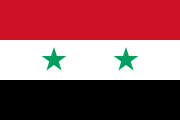 Abdel Hakim Amer - Egyptian military officer and political leader
Abdel Hakim Amer - Egyptian military officer and political leader Gamal Abdel Nasser – president of Egypt (1954-1970)
Gamal Abdel Nasser – president of Egypt (1954-1970).svg.png) Abdul Ahad Mohmand – the first Afghan cosmonaut
Abdul Ahad Mohmand – the first Afghan cosmonaut Ahmed Ben Bella – the first president of Algeria
Ahmed Ben Bella – the first president of Algeria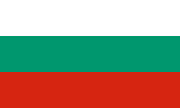 Zahari Zahariev - International Brigades pilot under Pseudonym Turk Halil Ekrem awarded #22 30 December 1936[6]
Zahari Zahariev - International Brigades pilot under Pseudonym Turk Halil Ekrem awarded #22 30 December 1936[6].svg.png) Georgi Ivanov – The first Bulgarian Cosmonaut
Georgi Ivanov – The first Bulgarian Cosmonaut.svg.png) Todor Zhivkov – Communist president of Bulgaria
Todor Zhivkov – Communist president of Bulgaria.svg.png) Aleksandar Panayotov Aleksandrov - The second Bulgarian Cosmonaut
Aleksandar Panayotov Aleksandrov - The second Bulgarian Cosmonaut.svg.png) Vladimir Zaimov - On the occasion of the 30th anniversary of his death in 1972
Vladimir Zaimov - On the occasion of the 30th anniversary of his death in 1972 Fidel Castro – leader of the Cuban communist government
Fidel Castro – leader of the Cuban communist government Arnaldo Tamayo – the first Hispanic and Cuban cosmonaut
Arnaldo Tamayo – the first Hispanic and Cuban cosmonaut Josef Buršík – for heroism during the liberation of Kiev, awarded in December 21, 1943, after the occupation of Czechoslovakia he gave the award back
Josef Buršík – for heroism during the liberation of Kiev, awarded in December 21, 1943, after the occupation of Czechoslovakia he gave the award back Otakar Jaroš – for heroism in the Third Battle of Kharkov, awarded in memoriam in April 17, 1943 as the second foreigner
Otakar Jaroš – for heroism in the Third Battle of Kharkov, awarded in memoriam in April 17, 1943 as the second foreigner Ján Nálepka (Slovak) – awarded in memoriam on May 2, 1945
Ján Nálepka (Slovak) – awarded in memoriam on May 2, 1945 Vladimír Remek – the first Czech in space and the first cosmonaut who wasn't a citizen of USSR or USA
Vladimír Remek – the first Czech in space and the first cosmonaut who wasn't a citizen of USSR or USA Antonín Sochor – for heroism during the liberation of Kyev, awarded in December 21, 1943
Antonín Sochor – for heroism during the liberation of Kyev, awarded in December 21, 1943 Ludvík Svoboda – communist president of Czechoslovakia and army general, commander of the 1st Czechoslovak Army Corps
Ludvík Svoboda – communist president of Czechoslovakia and army general, commander of the 1st Czechoslovak Army Corps Gustáv Husák – communist president of Czechoslovakia
Gustáv Husák – communist president of Czechoslovakia Stěpan Vajda (Rusyn) – for heroism during the liberation of Poland, awarded in memoriam on August 10, 1945
Stěpan Vajda (Rusyn) – for heroism during the liberation of Poland, awarded in memoriam on August 10, 1945 Richard Tesařík – for heroism during the liberation of Kyev, awarded on December 21, 1943
Richard Tesařík – for heroism during the liberation of Kyev, awarded on December 21, 1943 Jean-Loup Chrétien the first French astronaut
Jean-Loup Chrétien the first French astronaut Marcel Albert – decorated WWII fighter pilot (Normandie-Niemen)
Marcel Albert – decorated WWII fighter pilot (Normandie-Niemen) Jacques André – decorated WWII fighter pilot (Normandie-Niemen)
Jacques André – decorated WWII fighter pilot (Normandie-Niemen) Roland de La Poype – decorated WWII fighter pilot (Normandie-Niemen)
Roland de La Poype – decorated WWII fighter pilot (Normandie-Niemen) Marcel Lefèvre – decorated WWII fighter pilot (Normandie-Niemen)
Marcel Lefèvre – decorated WWII fighter pilot (Normandie-Niemen) Sigmund Jähn – the first German cosmonaut
Sigmund Jähn – the first German cosmonaut Walter Ulbricht – East German leader
Walter Ulbricht – East German leader Erich Honecker – East German leader
Erich Honecker – East German leader Erich Mielke – East German head of the Stasi
Erich Mielke – East German head of the Stasi Bertalan Farkas – the first Hungarian cosmonaut
Bertalan Farkas – the first Hungarian cosmonaut János Kádár – Hungarian politician
János Kádár – Hungarian politician Rakesh Sharma – the first Indian cosmonaut
Rakesh Sharma – the first Indian cosmonaut.svg.png) Jügderdemidiin Gürragchaa – the first Mongolian cosmonaut
Jügderdemidiin Gürragchaa – the first Mongolian cosmonaut Władysław Wysocki - Polish officer from the battle of Lenino
Władysław Wysocki - Polish officer from the battle of Lenino Juliusz Hibner - Polish communist and officer from the battle of Lenino
Juliusz Hibner - Polish communist and officer from the battle of Lenino Aniela Krzywoń - Polish soldier
Aniela Krzywoń - Polish soldier Mirosław Hermaszewski – the first citizen of Poland to travel into space
Mirosław Hermaszewski – the first citizen of Poland to travel into space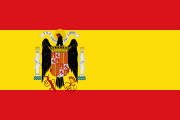 Ramón Mercader – assassinated Leon Trotsky in 1940
Ramón Mercader – assassinated Leon Trotsky in 1940 Rubén Ibárruri – son of the Spanish communist leader Dolores Ibárruri Gómez, killed in the Battle of Stalingrad while fighting for the Red Army
Rubén Ibárruri – son of the Spanish communist leader Dolores Ibárruri Gómez, killed in the Battle of Stalingrad while fighting for the Red Army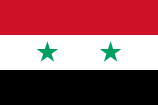 Muhammed Faris – the first Syrian cosmonaut
Muhammed Faris – the first Syrian cosmonaut Phạm Tuân – the first Vietnamese cosmonaut
Phạm Tuân – the first Vietnamese cosmonaut
See also
- Awards of the Soviet Union
- Hero of Socialist Labor
- Hero of the Russian Federation
- Hero of Belarus
- Order of Lenin
- Hero of Ukraine
Notes
- ↑ McDaniel and Schmitt, The Comprehensive Guide to Soviet Orders and Medals.
- ↑ (Russian) Гризодубова Валентина Степановна
- ↑ Rokossovsky held Polish citizenship while serving as Polish Defense Minister. This would technically make him the only "foreign citizen" to hold multiple titles of Hero of the Soviet Union, but it should be noted that he was awarded the titles while a Soviet citizen.
- ↑ "Pavel Romanovich Popovich" (in Russian). Space Encyclopedia ASTROnote. 11 June 2009. http://www.astronaut.ru/as_rusia/vvs/text/popovich.htm?reload_coolmenus. Retrieved 2009-09-30.
- ↑ http://en.wikipedia.org/wiki/List_of_World_War_II_air_aces
- ↑ http://www.warheroes.ru/hero/hero.asp?Hero_id=1055
External links
- (Russian) Website dedicated to Heroes of the Soviet Union and Russia
- (Russian) Hero of the Soviet Union - an article on the title
- (Russian) Alley of Heroes of the Soviet Union in Volgograd - history and photos
|
||||||||
|
||||||||||||||